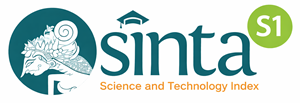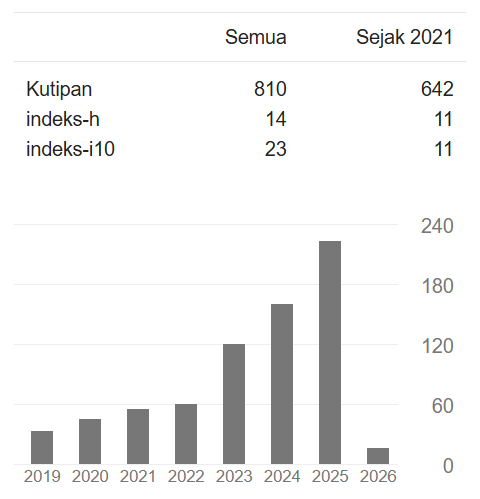EXPLORING AL-FĀRĀBĪ’S SECRETS IN HARMONIZING SCIENCE AND RELIGION
DOI:
https://doi.org/10.20871/kpjipm.v10i2.376Keywords:
Al-Fārābī’s Thought, Happiness, Harmonization of Science and ReligionAbstract
Harmonization between science and religion in al-Fārābī’s thought is an important topic in addressing the challenges of paradigm differences between the two in modern society. This research aims to explore al-Fārābī’s views on the integration of spiritual values and scientific rationality and their relevance to contemporary challenges. Using a qualitative method based on a literature study, this research analyzes al-Fārābī’s works as well as supporting literature that discusses the relationship between science and religion. The results show that al-Fārābī viewed science and religion as two different paths that lead to the same goal, which is the highest human happiness. Science provides rational knowledge to understand the physical world, while religion offers moral guidance to live life. In al-Fārābī’s view, the two complement each other, with science playing a role in revealing the nature of reality and religion providing ethical and spiritual meaning. This research emphasizes that al-Fārābī’s thoughts are relevant in the context of holistic education, ethical development in science and technology, and dialogue between science and religion. This approach can serve as a foundation for moral and rational value-based policies, creating a balance between intellectual progress and social responsibility. Thus, the harmonization of science and religion not only addresses the conflict between the two but also contributes to the construction of a just society with integrity. This research proposes that such integration can be a comprehensive solution to global issues such as technological ethics, climate change, and pluralism.
Downloads
References
Abdullah, M. Amin. 2020. “Mendialogkan Nalar Agama dan Sains Modern di Tengah Pandemi Covid-19.” MAARIF 15 (1): 11–39. https://doi.org/10.47651/mrf.v15i1.75.
Abdullah, Wan Suhaimi Wan. 2000. “Falsafah Al-Kindi Tentang Akal: Analisis Awalan dan Terjemahan Risalah Fi al-’Aql.” Afkar: Jurnal Akidah dan Pemikiran Islam 1 (1): 71–100.
Ali, Ishraq. 2023. “Philosophy and Religion in the Political Thought of Alfarabi.” Religions 14 (7): 908. https://doi.org/10.3390/rel14070908.
Andrade, Gabriel, Eid AboHamza, Yasmeen Elsantil, AlaaEldin Ayoub, and Dalia Bedewy. 2024. “Moral Approval of Xenotransplantation in Egypt: Associations with Religion, Attitudes towards Animals and Demographic Factors.” BMC Medical Ethics 25 (1): 19. https://doi.org/10.1186/s12910-024-01013-3.
Asmuni, Ahmad. 2021. “A Critical Study of Al-Farabi Philosophy Implementation at Education Non Islamic Higher Education in Indonesia.” Dinamika Ilmu 21 (2): 491–500. https://doi.org/10.21093/di.v21i2.3913.
Baihaki, Egi Sukma. 2020. “Islam dalam Merespons Era Digital: Tantangan Menjaga Komunikasi Umat Beragama di Indonesia.” SANGKéP: Jurnal Kajian Sosial Keagamaan 3 (2): 185–208. https://doi.org/10.20414/sangkep.v3i2.1926.
Faizin, Faizin. 2017. “Integrasi Agama dan Sains dalam Tafsir Ilmi Kementerian Agama RI.” Jurnal Ushuluddin 25 (1): 19–33. https://doi.org/10.24014/jush.v25i1.2560.
Fakhry, Majid. 2002. Alfarabi, Founder of Islamic Neoplatonism: His Life, Works and Influence. Oxford: Oneworld Publications.
Farjeat, Luis Xavier López, and José Alfonso Ganem Gutiérrez. 2023. “Religión y territorio en la filosofía política de al-Fārābī.” Estudios de Asia y África 58 (2): 315–42. https://doi.org/10.24201/eaa.v58i2.2834.
Fārābī, Abū Naṣr al-. 1985. Al-Farabi on The Perfect State: Abū Naṣr al-Fārābī Mabādiʼ Ārāʼ Ahl al-Madīnat al-Fāḍilah. Translated by Richard Walzer. Oxford: Clarendon Press.
Flanagan, Ruth. 2024. “‘Nobody Ever Told You, “Actually, This Feels Great”’: Religion Informed Sexual Health Education and Barriers to Developing Sexual Literacy.” International Journal of Educational Research Open 7 (December):100343. https://doi.org/10.1016/j.ijedro.2024.100343.
Grubišić, Ksenija. 2024. “Akademske slobode kao regulatorno načelo: između ideje i uloge sveučilišta.” Hrvatska i komparativna javna uprava 24 (2): 333–59. https://doi.org/10.31297/hkju.24.2.1.
Hossein Nasr, Seyyed. 2001. History of Islamic Philosophy. London and Newyork: Routledge History of World Philosophies.
Jančenkas, Ernestas. 2017. “Logikos epistemologinė ir politinė reikšmė Alfarabijaus filosofijoje.” LOGOS 93:201–16. https://doi.org/10.24101/logos.2017.82.
Khalidi, Muhammad Ali. 2024. “Al-Farabi on Acquiring a Philosophical Concept.” British Journal for the History of Philosophy 32 (4): 704–24. https://doi.org/10.1080/09608788.2022.2083071.
Kurniawan, Puji. 2018. “Masyarakat dan Negara Menurut Al-Farabi.” Jurnal el-Qanuniy: Jurnal Ilmu-Ilmu Kesyariahan dan Pranata Sosial 4 (1): 101–15. https://doi.org/10.24952/el-qonuniy.v4i1.1830.
López Farjeat, Luis Xavier, and José Alfonso Ganem Gutiérrez. 2023. “Religión y territorio en la filosofía política de al-Fārābī.” Estudios de Asia y África 58 (2): 315–42. https://doi.org/10.24201/eaa.v58i2.2834.
Makhsin, Mardzelah. 2006. Sains Pemikiran dan Etika. Selangor: PTS Media Group Sdn Bhd.
Parens, Joshua, and Joseph C Macfarland, eds. 2011. “The Attainment of Happiness.” In Medieval Political Philosophy: A Sourcebook. Cornell University Press.
Pincus, J. David. 2024. “Theoretical and Empirical Foundations for a Unified Pyramid of Human Motivation.” Integrative Psychological and Behavioral Science 58 (2): 731–56. https://doi.org/10.1007/s12124-022-09700-9.
Saada, Najwan. 2023. “Educating for Global Citizenship in Religious Education: Islamic Perspective.” International Journal of Educational Development 103 (November):102894. https://doi.org/10.1016/j.ijedudev.2023.102894.
Setiyawan, Agung. 2016. “Konsep Pendidikan Menurut Al-Ghazali dan Al-Farabi (Studi Komparasi Pemikiran).” Tarbawiyah: Jurnal Ilmiah Pendidikan 13 (01): 51–71.
Sirajuddin, Sirajuddin, ed. 2020. Buku Literasi Moderasi Beragama di Indonesia. Bengkulu: Zigie Utama.
Sudarsono. 1997. Filsafat Islam. Jakarta: PT. Rineka Cipta.
Suleimenov, Pirimbek, Yktiyar Paltore, Yesker Moldabek, and Galymzhan Usenov. 2023. “An Analysis of Aristotle's Principles in Al-Farabi's Study of Logic in the History and Philosophy of Science.” Acta Baltica Historiae Et Philosophiae Scientiarum 11 (2): 93–110. https://doi.org/10.11590/abhps.2023.2.05.
Syafi’i, Muhammad. 2017. “Etika dalam Pandangan Al-Farabi.” Jurnal Ilmiah Ilmu Ushuluddin 16 (2): 139–60. https://doi.org/10.18592/jiu.v16i2.1522.
Downloads
Published
How to Cite
Issue
Section
License
Copyright (c) 2024 Sita Isna Malyuna, Ah. Zakki Fuad, Ali Mas’ud

This work is licensed under a Creative Commons Attribution 4.0 International License.





























